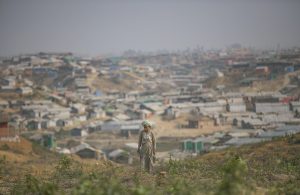The United Nations this week called for $876 million in funding for the Rohingya Muslims in Bangladesh for 2023, warning that the needs of the estimated 1 million refugees remain “urgent.”
In a statement Tuesday, the U.N. refugee agency, UNHCR, said that it is seeking funding for 978,000 Rohingya refugees in Cox’s Bazar and on the island of Bhasan Char, and 495,000 Bangladeshis in neighboring communities. The funding will provide these populations “with food, shelter, health care, access to drinkable water, protection services, education, as well as livelihood opportunities and skills development.”
“With decreased funding, refugees stand to face even more challenges in their daily lives in terms of proper nutrition, shelter materials, sanitation facilities and livelihood opportunities,” UNHCR said in the statement.
The UNHCR’s appeal comes amid an international funding crunch, with budgets being stretched by the COVID-19 pandemic and the current global economic downturn, and the attention of the global donor community pulled in different directions by a host of global crises.
Last month, the U.N. World Food Program (WFP) announced that it was slashing food aid to Rohingya refugees in Bangladesh, blaming a shortfall in international funding. The WFP said that it would reduce the value of its food assistance from $12 per person to $10 starting next month, and called for $125 million in urgent funding to fill the gap. As UNHCR said this week, “These ration cuts are likely to result in higher malnutrition rates, deteriorating health, school dropouts, increased incidents of child marriage, child labor, and gender-based violence.”
The southeastern Bangladeshi city of Cox’s Bazar has been host to around 1 million Rohingya civilians since 2017, when Myanmar military assaults drove more than 700,000 people out of Rakhine state into Bangladesh. These refugees are now housed in a series of ramshackle but increasingly permanent settlements around Cox’s Bazar.
Stranded in a form of legal and political limbo, and cut off from most livelihood opportunities, most now rely almost entirely on humanitarian assistance. There is also little prospect of them returning to Myanmar, where the political instability prompted by the military coup of February 2021 has led to a worsening of the conflict. The ramshackle and frequently unsafe nature of the camps was highlighted by the massive fire that tore through a large part of Camp 11 in Cox’s Bazar on March 5, which destroyed more than 2,000 shelters and over 90 facilities, including hospitals and learning centers, leaving thousands of people homeless.
Indeed, the dire situation in the camps, which also includes rampant sexual abuse and the threats posed by criminal gangs, has prompted increasing numbers of Rohingya to attempt perilous ocean journeys across the Andaman Sea, in search of sanctuary in other parts of Southeast Asia, particularly Malaysia and Indonesia. In January, the UNHCR reported that more than 3,500 people attempted to flee Myanmar and Bangladesh by sea in 2022, nearly five times more than the year prior.
The U.N.’s request offers another reminder, if one were needed, that one of the world’s largest refugee crises continues to smolder, with little chance of resolution. With the Rohingya refugees’ plight having receded to the margins of international consciousness, mustering the funds necessary to sustain current aid efforts is likely to remain an annual challenge.

































